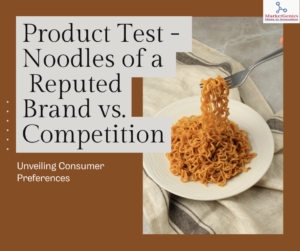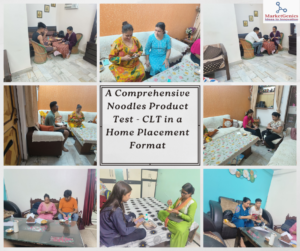In today’s competitive food business, understanding consumer preferences is critical for brands looking to stay ahead. MarketGenics recently conducted a comprehensive product test to acquire a better understanding of consumer behavior, particularly with regard to noodles of a reputed brand, which are a household staple. This exam used a Central Location exam (CLT) in a Home Placement format to ensure that the information acquired was trustworthy and representative of real-world experiences. Here’s a closer look at how we carried out this experiment:

The Central Location Test (CLT) is a well-known way of getting instant consumer input in a controlled setting. However, when combined with a Home Placement approach, it provides for a more authentic review, especially when the product needs to be cooked and served. This method not only captures the initial reactions but also offers more information about how the product functions in a real-world situation, where consumers make judgments based on their unique tastes and daily routines.
To ensure our findings were representative, we carefully selected a diverse group of 200 participants, consisting of both males and females aged 18 to 35 years. These participants came from socio-economic classes A and B (SEC A/B), reflecting a wide range of consumer profiles. This demographic is particularly relevant as it includes the key decision-makers/consumers in household purchases, especially for grocery items like noodles. The product test was conducted in varied centers of Delhi and Bangalore.

For the Home Placement component of the test, we created an appropriate kitchen condition. This allowed our staff to prepare the noodles and serve it to the consumers hot as they would in their daily lives. We assured that the feedback we received was genuine and reflective of the product’s performance in a typical household environment.
To avoid potential biases and ensure that feedback was exclusively focused on the product’s attributes, we used a Monadic Sequential method. This method had participants evaluate each noodle product one at a time, in a random order. Importantly, the test was conducted in a blind format, which meant that participants were unaware of the brand identities during the evaluation. This method is crucial for removing brand bias and ensuring that feedback focuses solely on taste, texture, scent, and overall satisfaction.
After the tasting, our researchers conducted Qualitative Semi-structured Interviews with the participants. These interviews gave an opportunity for participants to express their own thoughts and experiences. They evaluated flavor, texture, taste, mouthfeel, aftertaste while comparing the many noodle brands they tried.
The semi-structured approach of these interviews allowed us to delve deeply into specific topics while also allowing participants to freely express their ideas. This technique allowed us to acquire a more accurate picture of not only what the participants liked or disliked, but also the reasons for their preferences.
The qualitative insights gained from the in-depth interviews enabled us to go deeper into the reasons for these preferences, providing our client with actionable data that will help guide their future efforts.
At MarketGenics, we believe that such deep consumer insights are vital in assisting brands to make effective decisions in an increasingly competitive industry. Understanding what genuinely matters to consumers allows firms to better customize their offerings to market demands and stay ahead of the competition.
If you’d like to learn more about how MarketGenics can help your brand with similar in-depth customer research, please contact us. Our team is available to help you make strategic decisions using data-driven insights.

MarketGenics India is a MRSI certified company.
Send us your resume at
info@marketgenics.co
© 2025 MarketGenics India Pvt Ltd.; All rights reserved